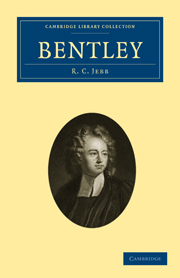Book contents
- Frontmatter
- PREFATORY NOTE
- Contents
- CHAPTER I EARLY LIFE. THE LETTER TO MILL
- CHAPTER II THE BOYLE LECTURES
- CHAPTER III LEARNED CORRESPONDENCE. THE KING'S LIBRARIAN
- CHAPTER IV THE CONTROVERSY ON THE LETTERS OF PHALARIS
- CHAPTER V BENTLEY'S DISSERTATION
- CHAPTER VI TRINITY COLLEGE, CAMBRIDGE
- CHAPTER VII BENTLEY AS MASTER OF TRINITY
- CHAPTER VIII LITERARY WORK AFTER 1700.—HORACE
- CHAPTER IX OTHER CLASSICAL STUDIES. — TERENCE. — MANILIUS. — HOMER
- CHAPTER X THE PROPOSED EDITION OF THE NEW TESTAMENT
- CHAPTER XI ENGLISH STYLE. EDITION OF PARADISE LOST
- CHAPTER XII DOMESTIC LIFE. LAST YEARS
- CHAPTER XIII BENTLEY'S PLACE IN THE HISTORY OF SCHOLARSHIP
CHAPTER XI - ENGLISH STYLE. EDITION OF PARADISE LOST
Published online by Cambridge University Press: 07 September 2010
- Frontmatter
- PREFATORY NOTE
- Contents
- CHAPTER I EARLY LIFE. THE LETTER TO MILL
- CHAPTER II THE BOYLE LECTURES
- CHAPTER III LEARNED CORRESPONDENCE. THE KING'S LIBRARIAN
- CHAPTER IV THE CONTROVERSY ON THE LETTERS OF PHALARIS
- CHAPTER V BENTLEY'S DISSERTATION
- CHAPTER VI TRINITY COLLEGE, CAMBRIDGE
- CHAPTER VII BENTLEY AS MASTER OF TRINITY
- CHAPTER VIII LITERARY WORK AFTER 1700.—HORACE
- CHAPTER IX OTHER CLASSICAL STUDIES. — TERENCE. — MANILIUS. — HOMER
- CHAPTER X THE PROPOSED EDITION OF THE NEW TESTAMENT
- CHAPTER XI ENGLISH STYLE. EDITION OF PARADISE LOST
- CHAPTER XII DOMESTIC LIFE. LAST YEARS
- CHAPTER XIII BENTLEY'S PLACE IN THE HISTORY OF SCHOLARSHIP
Summary
As a writer of English, Bentley is represented by the Dissertation on Phalaris, the Boyle Lectures, the Remarks on a Discourse of Free-thinking, sermons, and letters. These fall mainly within the period from 1690 to 1730. During the earlier half of Bentley's life the canon of polite prose was Dryden or Temple; during the latter half it was Addison. Bentley's English is stamped, as we shall see, with the mind of his age, but has been very little influenced by any phase of its manner. His style is thoroughly individual; it is, in fact, the man. The most striking trait is the nervous, homely English. ‘Commend me to the man that with a thick hide and solid forehead can stand bluff against plain matter of fact.’ ‘If the very first Epistle, of nine lines only, has taken me up four pages in scouring, what a sweet piece of work should I have of it to cleanse all the rest for them!’ ‘Alas, poor Sophist! ‘twas ill luck he took none of the money, to fee his advocates lustily; for this is like to be a hard brush.’ The ‘polite ‘writers after the Restoration had discarded such English as vulgar; and we have seen that Boyle's Oxford friends complained of Bentley's ‘descending to low and mean ways of speech.’ But, if we allow for the special influence of scriptural language on the Pilgrim's Progress, Bentley drew from the same well as John Bunyan, who died when Bentley was sixteen.
- Type
- Chapter
- Information
- Bentley , pp. 172 - 191Publisher: Cambridge University PressPrint publication year: 2010First published in: 1882



